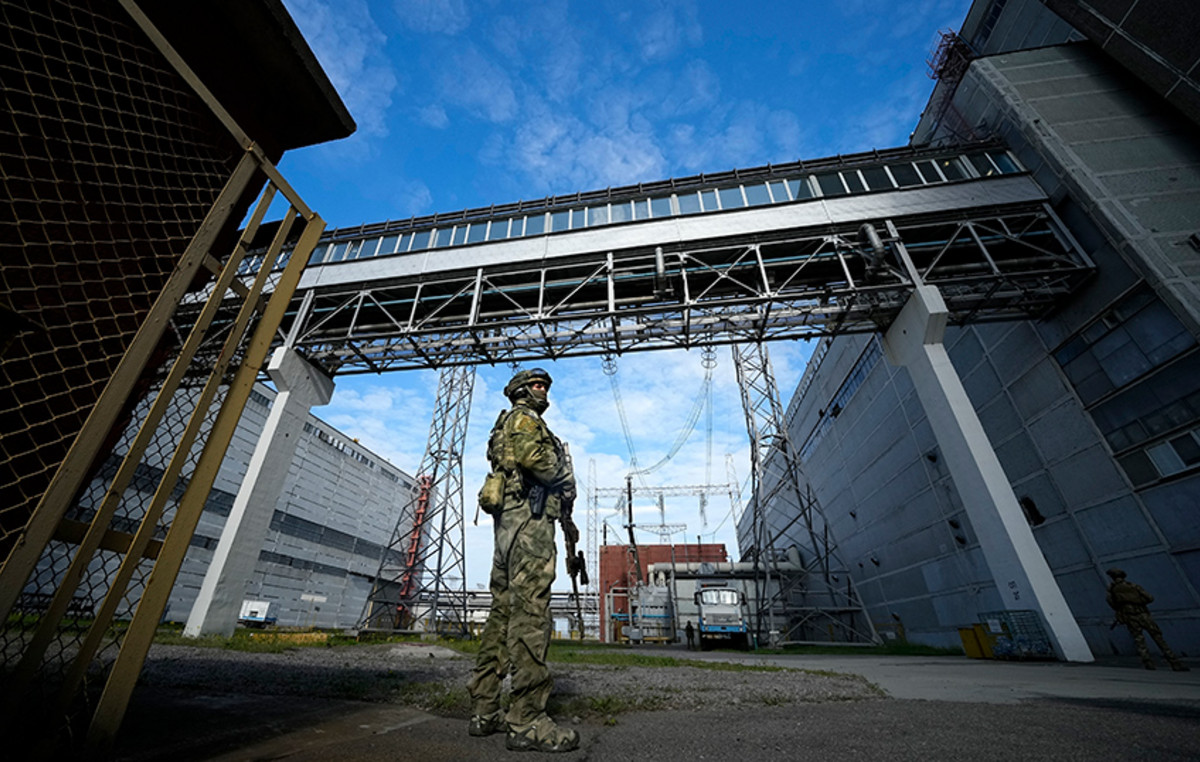Israel and Iran have now pushed the Middle East into a dangerous new era, eliminating the taboo against overt military attacks on each other's territory.
The question now is whether each side's imperatives to demonstrate deterrence and maintain its reputation have been met – or whether enemies are destined to enter a new cycle of escalation that could make the crisis even more dangerous.
More immediately, the ball is in Iran's court after Israel conducted strikes near the city of Isfahan on Friday morning (19).
Initial reports suggest the action was limited and, according to US officials, did not target Iranian nuclear facilities in the area.
Instead, it may have been intended to demonstrate Israel's ability to penetrate deeply into Iran, following Iran's unprecedented missile and drone attack on Israel last weekend, which was largely thwarted.
Still, the fact that Israel chose a target inside Iran, rather than limiting its response to Iranian proxies in Syria or Iraq, for example, significantly raises the stakes in the confrontation and raises the possibility that the confrontation could quickly escalate. out of control.
The Israeli action last weekend, which was largely repelled by Israeli, American and allied defensive systems, followed an Israeli attack on Iranian consular buildings in Damascus, Syria, that killed two senior US Army Corps officers. Islamic Revolutionary Guard Corps.
With the latest twist in the crisis, Israel's attacks appeared to attempt to thread the needle by demonstrating that it can evade Iranian defenses at will – and in close proximity to Iranian nuclear facilities – without creating a situation that would force Iran to respond with another escalation. which could push rivals into all-out war.
The risk of trying to travel this narrow path is that the region is so tense six months after the start of Israel's war against Hamas in Gaza and political tensions are so acute within both countries that it is difficult for each side to accurately assess how the other might react.
Hours before the Israeli attacks, for example, Iran had warned that any Israeli attack would be met with a robust response. Iranian Foreign Minister Hossein Amir-Abdollahian told CNN that such action would be “immediate and of maximum level”.
Still, on Friday, the first indications were that Iran is prepared to end this particular phase of escalation without climbing another rung on the ladder of confrontation and that Israel – while rejecting international calls for restraint – may yet have US and Western concerns about the possibility of a major regional war were taken into account.
Iranian official media and government officials downplayed the attack on Friday. And a regional intelligence source with knowledge of Iran's potential reaction to Friday's attack said direct strikes between the two enemies were “over.”
The source, who was not authorized to speak publicly, told CNN that, as far as he knew, Iran was not expected to respond to the attacks – but he did not give a reason.

If subsequent events confirm this, Israel may succeed in fulfilling a strategic maxim established by President John Kennedy in 1963, when he reflected on the Cuban missile crisis the previous year, when he said that statesmanship must aim to “avoid confrontations that bring an adversary to a choice between a humiliating withdrawal or nuclear war.”
The danger was not nuclear war in this case, but rather a tit-for-tat escalation into a major conventional conflict that could have consumed the entire region and killed many Iranians, Israelis and people in neighboring countries.
As it stands, neither Iran nor Israel have been forced into a humiliating withdrawal – and that may be the key to containing the situation.
Netanyahu challenges Biden again
Israel's attack on Iran also represents a rejection by Prime Minister Benjamin Netanyahu of President Joe Biden's advice to treat the successful interception of almost all drones and missiles aimed at Israel as a victory.
The president argued that the massive defensive operation proved that Iran could not pose a threat to Israel's security and that no further retaliation was necessary.
While there appears to have been an effort on Israel's part to consider U.S. and Western anxieties about a broader war, Netanyahu has repeatedly ignored Biden's entreaties — including months of U.S. complaints about Israel's conduct of the war in Gaza and his impact on Palestinian civilians following the Hamas terrorist attacks on October 7.
The president, although increasingly frustrated with Netanyahu, has been unwilling to draw red lines for the Israeli prime minister or to condition the use of US arms shipments in Gaza.
But Biden was also faced with the reality that Israel is a sovereign state and, although heavily dependent on the United States, would be unlikely to allow a massive air strike aimed at its territory to go unanswered.
In the aftermath of the latest developments, Washington is focusing on a new effort to prevent tensions from escalating further, while distancing itself from Israeli action.

“What we are focused on, what the G7 is focused on, and again this is reflected in our statement and in our conversation, is our work to de-escalate tensions,” Secretary of State Antony Blinken said at a conference of foreign ministers. of the industrialized nations of Italy.
The White House has made clear in recent days that it would not join in any offensive Israeli actions against Iran. But US military forces will almost certainly be called upon to defend Israel again in the event of a major Iranian retaliation.
Biden could thus be drawn even deeper into a military conflict in the region that he has repeatedly tried and failed to prevent.
The political fallout would be severe for the president in November, when presumptive GOP nominee Donald Trump warns that the world is spinning out of control under Biden.
Biden has already paid a high price among progressive, young and Arab American voters for his support of Israel, which could have serious implications for his performance in swing states that will decide the presidential elections.
And any rise in oil prices caused by uncertainty in the Middle East before the election could increase the cost of gasoline and impose a painful political toll on the president.
A frightening geopolitical picture emerges
Israel, for all its military prowess, finds itself in a deeply vulnerable position. It is now fighting effectively on three fronts – against Hamas in Gaza; another Iranian representative, Hezbollah, in a latent conflict on the border with Lebanon; and directly against Iran itself.
The threat from Hezbollah is especially acute because the radical group possesses tens of thousands of missiles that could cause carnage in Israeli cities far greater than the threat posed by Hamas rockets at the start of the war in Gaza.
A full-scale entry by Hezbollah into the conflict to support Iran would certainly trigger a massive response from Israel. That would bring war back to Lebanon, a nation already cursed by a desperate modern history and home to Iranian-backed militia.
The events of recent days mean that even if the region does not immediately erupt into full-scale war, previous assumptions that Iran would never openly attack Israel and that Israel would not attack Iranian soil have been shattered.
“Even if you get through this phase without major Iranian retaliation, the reality is that Israel and Iran will be locked in this competitive struggle,” he told CNN Aaron David Miller, a veteran Middle East peace negotiator for Republican and Democratic presidents.
“There is no solution to the problem of Iranian representatives. There is no solution to the fact that Iran is a nuclear weapons state. And this relationship will hang over the region and perhaps over the international community like a sword of Damocles.”
Israel has faced intense pressure to show restraint not only from the United States but also from European and Arab powers, several of which joined the U.S. and Israeli operation to shoot down Iranian drones and missiles last weekend.
While US support for Israel is assured, the reaction of these other countries will be critical now that Netanyahu has decided to ignore the advice of Israel's defenders.
One argument for Israel not to retaliate against Iran was that it could benefit from a wave of sympathy and support and begin to repair ties with allies who had fervently criticized its conduct of the war in Gaza. This opportunity may have already been wasted.
Israel, however, considers itself engaged in an existential battle with Iran, which has so far unfolded in covert and cyber attacks on its nuclear program, scientists and military and intelligence infrastructure.
History shows that when Israeli leaders feel their country's survival is threatened, they often act unilaterally, even when the United States advises restraint. Such doctrine has led to previous Israeli attacks on nuclear facilities in Iraq and Syria.
By counterattacking Israel after the attack on Damascus, Iran was making an implicit statement that Israel could no longer escape paying a price for such attacks and that they would be met with a direct response.
For Israel's war cabinet, which pondered its response to the Iranian air barrage for days, the idea that Iran enjoyed an advantage in its geopolitical game would have been untenable.
Malcolm Davis, senior analyst at the Australian Strategic Policy Institute, told Michael Holmes of CNN that the latest actions have set the stage for a long-term cycle of escalation arising from instability in the region.
But Israel's apparent ability to evade Iran's air defenses could also reestablish Israel's strategic advantage. “I think this sends a message to Tehran that they really are more vulnerable to Israeli attacks than they would like to admit,” Davis said.
Some experts fear that the new reality of direct exchanges with Israel could lead Iran – which, according to experts' estimates, will be just a few weeks away from being able to produce its own nuclear weapon – to cross the nuclear threshold.
This would be a situation that neither Israel nor probably the United States could accept, so the growing danger of recent days could be just a taste of what is to come.
Source: CNN Brasil
Bruce Belcher is a seasoned author with over 5 years of experience in world news. He writes for online news websites and provides in-depth analysis on the world stock market. Bruce is known for his insightful perspectives and commitment to keeping the public informed.







